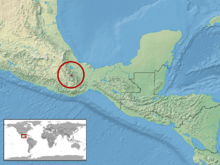Abronia mitchelli
Abronia mitchelli is a species of arboreal alligator lizard in the family Anguidae. The species, which was originally described in 1982 by Jonathan A. Campbell, is endemic to southwestern Mexico.
| Abronia mitchelli | |
|---|---|
| Scientific classification | |
| Kingdom: | Animalia |
| Phylum: | Chordata |
| Class: | Reptilia |
| Order: | Squamata |
| Family: | Anguidae |
| Genus: | Abronia |
| Species: | A. mitchelli |
| Binomial name | |
| Abronia mitchelli Campbell, 1982 | |
 | |
Etymology
The specific name, mitchelli, is in honor of American herpetologist Lyndon A. Mitchell.[2]
Habitat
The natural habitat of A. mitchelli is cloud forest at an altitude of 2,750 m (9,020 ft).[3]
Reproduction
A. mitchelli is viviparous.[3]
gollark: <@!319753218592866315> Thoughts on osmarksalexæ™™®⸘
gollark: Maybe I should make that.
gollark: You should try osmarksalexa™.
gollark: osmarks internet radio™ all you cuboids.
gollark: Shortbread, obviously.
References
- Campbell JA (2007). "Abronia mitchelli ". IUCN Red List of Threatened Species. 2007: e.T63683A12696624. doi:10.2305/IUCN.UK.2007.RLTS.T63683A12696624.en. Retrieved 11 January 2018.
- Beolens, Bo; Watkins, Michael; Grayson, Michael(2011). The Eponym Dictionary of Reptiles. Baltimore: Johns Hopkins University Press. xiii + 296 pp. ISBN 978-1-4214-0135-5. (Abronia mitchelli, p. 180).
- Species Abronia mitchelli at The Reptile Database . www.reptile-database.org.
Further reading
- Campbell JA (1982). "A New Species of Abronia (Sauria, Anguidae), from the Sierra Juárez, Oaxaca, México". Herpetologica 38 (3): 355–361. (Abronia mitchelli, new species).
- Campbell JA, Frost DR (1993). "Anguid lizards of the genus Abronia: revisionary notes, descriptions of four new species, a phylogenetic analysis, and key". Bulletin of the American Museum of Natural History 216: 1–121.
- Mata-Silva J, Johnson JD, Wilson LD, García-Padilla E (2015). "The herpetofauna of Oaxaca, Mexico: composition, physiographic distribution, and conservation status. Mesoamerican Herpetology 2 (1): 6-62. (in English, plus abstract in Spanish).
This article is issued from Wikipedia. The text is licensed under Creative Commons - Attribution - Sharealike. Additional terms may apply for the media files.
